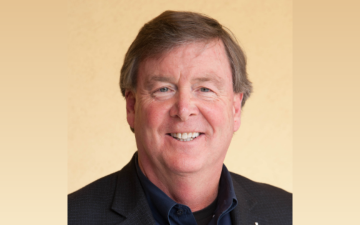
Tom Kelly is a venture consultant at Forgepoint Capital, a permanent deacon in the Catholic Church for the Archdiocese of San Francisco, and one of the newest members of the Ethics Center Advisory Board. Within all of these roles, one thing remains constant: his connection and dedication to an ethical standard. When asked about his roles in technology and religion, Kelly says “I don’t think you can separate them. In fact, I can’t. When you do separate them, the outcomes become troublesome.”
Kelly was initially connected to the Ethics Center through his long-standing work with the Ignatian Center, which together with the Ethics Center and the Miller Center is one of three Centers of Distinction at SCU. Kelly served on the Ignatian Center's Advisory Board and as the chair for a number of years. Through that involvement, his integration throughout campus, and Kelly's overall dedication to the advancement of the university, he was a natural choice to consider as an addition to the Ethics Center Advisory Board and was invited by Executive Director, Don Heider to become involved.
For Kelly, ethics is deeply connected to the work he had been doing at the Ignatian Center. In Kelly’s view, ethics stems from moral philosophy, and as he says, “Moral philosophy and ethics are entwined. Business, education, the marketplace, all these things are founded in ethics.” Both his career in religion and technology have, in Kelly’s eyes, stemmed from a question of ethics that must be answered above all else.

As a member of the software industry, Kelly has been present for many key developments over the years. As technology continues to grow increasingly faster, he says we are having trouble taking the time to answer two key questions: “Are we able to do this? Should we do this?” Recently, his main focus and concern when it comes to technology has been around AI. In his own words, “we are talking about an incredible event. This is an internet-level event milestone.” Kelly sees AI as a powerful force for the future of humanity and technology, saying that he believes, “AI will dwarf what we saw in the 90s.” This work on AI led Kelly to become a part of the Institute for Technology, Ethics, and Culture -- a collaboration between the Ethics Center and the Centre for Digital Culture of the Vatican’s Dicastery for Culture and Education. Kelly’s expertise in ethics, technology, and religion made him the perfect candidate to join the project.
As we approach a new technology boom with unprecedented effects on the relationship between humans and technology, Kelly says we have to keep asking questions and maintaining the value of privacy. “How do we make it possible for us to do the things we want to do in social media without asking people to check their privacy at the door?” In Kelly’s mind, social media and other tools must be reined in and encouraged not to overstep their bounds. While the answers to these questions may not be easy, Kelly asks them regardless.
When it comes to the space that the Ethics Center occupies on campus, Kelly emphasizes the importance of the university’s mission and its values. “Embedded in the SCU environment are the principles of competence, conscience, and compassion.” While he says no one of those principles can be achieved without utilizing the others, Kelly says that, “the role of the Ethics Center on campus is to be the voice of conscience.” In addition, the Ethics Center represents, for Kelly, a space that can demonstrate the benefits of moral and ethical behavior without necessarily utilizing faith. In his own words, “The Ethics Center allows us to define good character and strong morals within a diverse, multi-faith, multi-cultural environment.”
Lucas Bush ’23, political science and ethnic studies major and a marketing and communications intern with the Markkula Center for Applied Ethics, contributed to this story.
